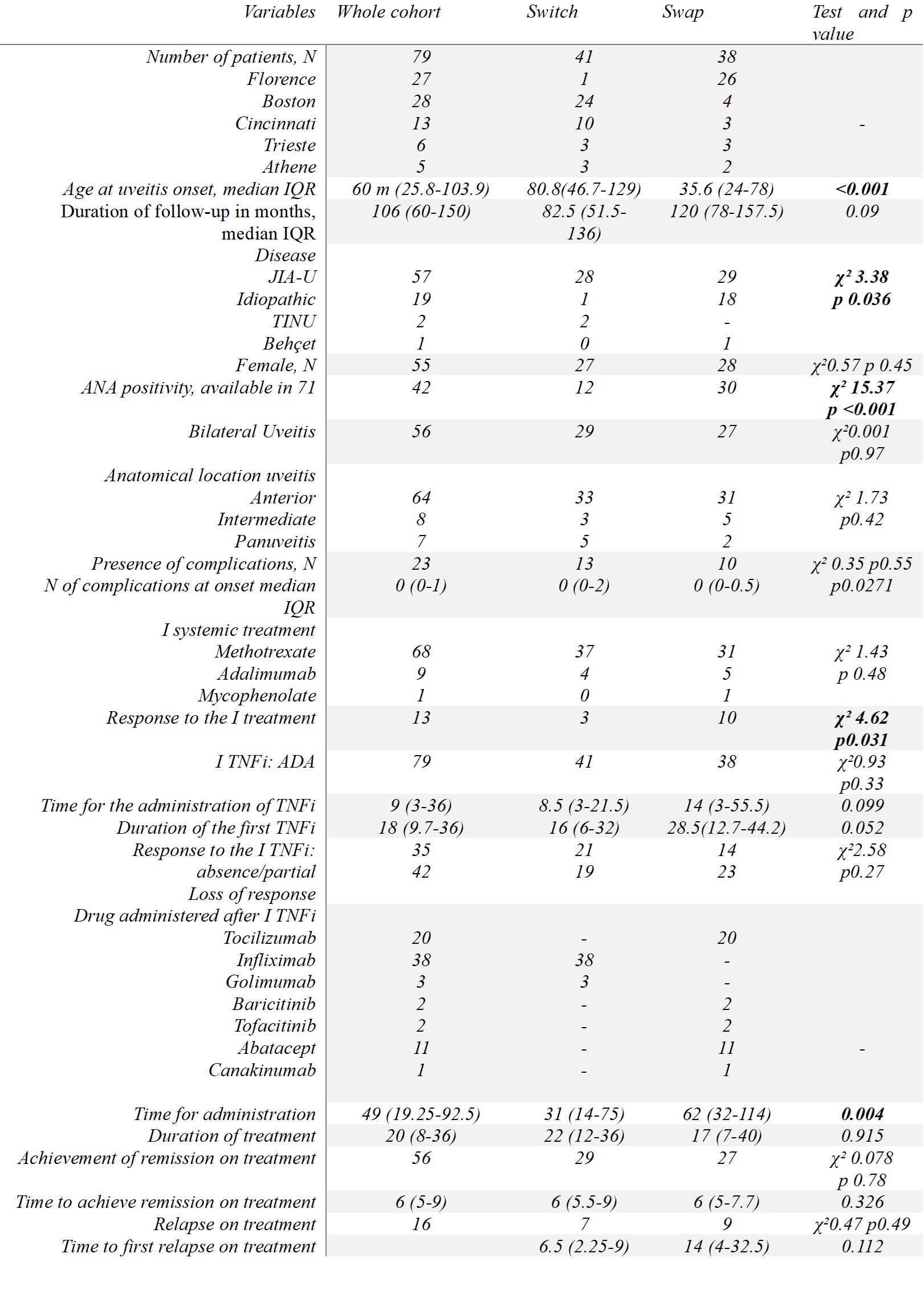Session Information
Session Type: Poster Session A
Session Time: 10:30AM-12:30PM
Background/Purpose: Childhood chronic non-infectious uveitis (cNIU) is a sight-threatening condition that can lead to blindness if not appropriately treated. cNIU is typically associated with Juvenile Idiopathic Arthritis or can occur in isolation when idiopathic. Adalimumab (ADA) is the only approved treatment for cNIU and TNF inhibitors (TNFi) are the recommended first line-biologic treatment of cNIU. However, 25% of patients do not achieve disease remission. In these cases, there is no consensus whether switching to another TNFi or swapping drug class is more effective. We aim to evaluate the efficacy of the switch OR swap therapeutic approach to treating cNIU refractory to primary TNFi and the efficacy of the different drugs in these patients.
Methods: In a multicentre international retrospective study involving pediatric rheumatology centres in Florence, Boston, Cincinnati, Athens and Trieste, we enrolled children with a diagnosis of cNIU unresponsive to ADA and required the use of another biologic. Remission on treatment was determined according to the grading of ocular inflammation using the Standardization of Uveitis Nomenclature (SUN) criteria. Statistical analysis was performed using Spss 29 for windows. A p-value < 0.05 was considered significant.
Results: We collected the data of 79 children with cNIU, of whom 57 had JIA-associated uveitis (JIA-U) and 17 had idiopathic uveitis (IU) (Table 1). Seventy-nine were treated with ADA as first-line TNFi. Forty-one children did not respond to treatment and were “switched” to a second TNFi (38 infliximab, 3 golimumab), and 38 “swapped” to a non-TNFi biologic (20 tocilizumab, 2 baricitinib, 2 tofacitinib, 11 abatacept, 1 canakinumab). We identified a significant difference in treatment approach, European swapped more frequently than American (χ² 0.078 p 0.78). We did not find significant differences in remission between switching TNFi and swapping drug class (χ² 0.078 p 0.78) or among the different drugs (χ² 32.87p < 0.001). On sub-analysis of the different sub-types of uveitis (JIA-U and Idiopathic), we did not find significant differences in remission of patients for either switching TNFi or swapping to non-TNFi (χ²0.021 p0.88 and χ² 0.016 p 0.90 respectively) or for the different drugs regardless of switch/swap (χ²5.03 p0.754 and χ²2.57 p 0.463 respectively). There were no significant differences based on anatomical location- anterior NIU (switch vs swap χ²0.219 p0.64 and based on the drugs χ²4.97 p0.760) and non-anterior NIU (χ²0.117 p0.733 and χ²2.97 p0.395)., Furthermore no significant differences were assessed considering the responder to the primary TNFi (χ²0.012 p0.912 and χ²3.35 p0.851) and non-responder (χ²0.024 p0.877 and χ²5.4 p0.24)
Conclusion: Management of childhood cNIU is challenging and evidence is scarce on treatment after ADA failure. This is one of the largest multicentre international cohorts that showed that switch and swap are reasonable next treatment and there is no preference for a specific class of biologics and all are reasonable therapeutic approach for the management of cNIU. The use of the European and US cohort allowed us to make a comparison between the two treatments approach. Further data are needed to make specific comparison among drugs.
 Table1: demographic and clinical characteristics of the population in study. Comparison between the population that switched and swapped the treatment. In bold the significant differences.
Table1: demographic and clinical characteristics of the population in study. Comparison between the population that switched and swapped the treatment. In bold the significant differences.
.jpg) Figure 1: Figurative representation of the population included and achievement of remission with the two treatments approach
Figure 1: Figurative representation of the population included and achievement of remission with the two treatments approach
To cite this abstract in AMA style:
Maccora I, Chang M, Angeles-Han S, Taddio A, Fotis L, de Libero C, Mangin M, Duell A, Gabrielli M, Chiotopoulou K, Sutton L, Miraldi Utz V, Simonini G. The SOS project: to Switch Or to Swap After Adalimumab failure for the management of childhood non-infectious uveitis in an international cohort [abstract]. Arthritis Rheumatol. 2025; 77 (suppl 9). https://acrabstracts.org/abstract/the-sos-project-to-switch-or-to-swap-after-adalimumab-failure-for-the-management-of-childhood-non-infectious-uveitis-in-an-international-cohort/. Accessed .« Back to ACR Convergence 2025
ACR Meeting Abstracts - https://acrabstracts.org/abstract/the-sos-project-to-switch-or-to-swap-after-adalimumab-failure-for-the-management-of-childhood-non-infectious-uveitis-in-an-international-cohort/
